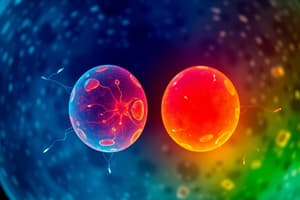Podcast
Questions and Answers
Centromeres divide in which of the following?
Centromeres divide in which of the following?
- Only mitosis
- Only meiosis II
- Mitosis and meiosis II (correct)
- None of the above
Which of the following describes meiosis II in humans?
Which of the following describes meiosis II in humans?
- 2n -> 1n
- 1n -> 1n (correct)
- 2n -> 2n
- None of the above
Arrange the following events in the proper order:
Arrange the following events in the proper order:
Separation of homologues = 4 Synapsis = 1 Crossing over = 2 Independent assortment = 3
When does DNA replicate in germline cells?
When does DNA replicate in germline cells?
If crossing over occurs between 2 chromatids on a single pair of homologous chromosomes, how many gametes will have a recombinant phenotype?
If crossing over occurs between 2 chromatids on a single pair of homologous chromosomes, how many gametes will have a recombinant phenotype?
What is the result if a homologous pair of chromosomes fails to separate during meiosis I?
What is the result if a homologous pair of chromosomes fails to separate during meiosis I?
The spindle apparatus is fully formed by the end of which phase?
The spindle apparatus is fully formed by the end of which phase?
Separation of ________ occurs in anaphase II of meiosis.
Separation of ________ occurs in anaphase II of meiosis.
At the end of meiosis, how many cells are formed?
At the end of meiosis, how many cells are formed?
Why are two phases of meiosis necessary?
Why are two phases of meiosis necessary?
What might make sister chromatids differ from each other?
What might make sister chromatids differ from each other?
If sister chromatids failed to separate during meiosis II, what would the resulting gametes look like?
If sister chromatids failed to separate during meiosis II, what would the resulting gametes look like?
Daughter cells produced in meiosis have how many chromosomes compared to daughter cells produced in mitosis?
Daughter cells produced in meiosis have how many chromosomes compared to daughter cells produced in mitosis?
The number of cells produced in meiosis is how many times more than that produced during mitosis?
The number of cells produced in meiosis is how many times more than that produced during mitosis?
Which of the following is unique to meiosis?
Which of the following is unique to meiosis?
How is the formation of the spindle during mitosis and meiosis I different?
How is the formation of the spindle during mitosis and meiosis I different?
Chromosome duplication occurs prior to both mitosis and meiosis.
Chromosome duplication occurs prior to both mitosis and meiosis.
Which of the following is not a haploid?
Which of the following is not a haploid?
How does chromatid cohesion maintained by cohesion proteins differ in mitosis and meiosis?
How does chromatid cohesion maintained by cohesion proteins differ in mitosis and meiosis?
Flashcards are hidden until you start studying
Study Notes
Mitosis and Meiosis
- Centromeres divide during both mitosis and meiosis II, essential for proper chromosome segregation.
Meiosis II Overview
- In humans, meiosis II results in the transition from diploid (2n) to haploid (1n) cells.
Sequence of Events in Meiosis
- Events during meiosis occur in the following sequence:
- Synapsis (formation of homologous pairs).
- Crossing over (exchange of genetic material).
- Independent assortment (random distribution of chromosomes).
- Separation of homologues.
DNA Replication in Germline Cells
- DNA replication occurs during the S phase of the cell cycle in germline cells, preparing for meiosis.
Recombinant Gametes
- When crossing over occurs between two chromatids, two out of four gametes will exhibit a recombinant phenotype.
Non-Separation in Meiosis I
- Failure of homologous chromosomes to separate during meiosis I results in two gametes with two affected chromosomes and two with none.
Spindle Apparatus Formation
- The spindle apparatus is fully formed by the end of prophase II in meiosis, crucial for the movement of chromosomes.
Anaphase II of Meiosis
- Sister chromatids are separated during anaphase II, allowing for proper distribution into daughter cells.
End of Meiosis
- The end of meiosis yields four haploid cells, each consisting of a single chromatid.
Necessity of Two Phases in Meiosis
- The two phases of meiosis are necessary to reduce the chromosome number and to separate sister chromatids efficiently.
Crossing Over Effects
- If sister chromatids experience crossing over, they may differ from one another, increasing genetic diversity.
Consequences of Non-Separation in Meiosis II
- If sister chromatids do not separate during meiosis II, results will include:
- Two normal gametes.
- One gamete with two of the affected chromosomes.
- One gamete with none of the affected chromosomes.
Comparison to Mitosis
- Daughter cells produced in meiosis have half the chromosome number compared to those produced in mitosis.
Cell Count in Meiosis
- Meiosis generates twice the number of cells compared to mitosis due to the two rounds of division.
Unique Features of Meiosis
- Crossing-over is a unique feature of meiosis, enhancing genetic variation among offspring.
Spindle Formation Differences
- In mitosis, spindle fibers from both centromeres attach to each chromosome's centromere, while in meiosis I, fibers attach from only one centromere.
Chromosome Duplication
- Chromosome duplication is a prerequisite for both mitosis and meiosis, ensuring each daughter cell receives the correct number of chromosomes.
Non-Haploid Cells
- Cells in prophase I are not haploid; they are diploid (2n) as they contain homologous chromosome pairs.
Cohesion Proteins in Mitosis vs. Meiosis
- Cohesion between sister chromatids is maintained during anaphase I of meiosis but not during anaphase of mitosis, reflecting different regulatory mechanisms in cell division.
Studying That Suits You
Use AI to generate personalized quizzes and flashcards to suit your learning preferences.





